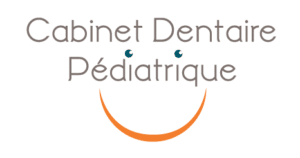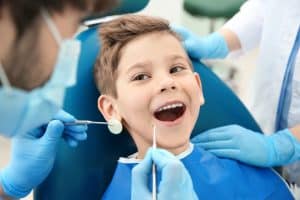Around the age of six, children's first baby teeth start to fall out, but sometimes some of them don't fall out. Find out the causes and possible solutions for baby teeth that don't fall out.
What to do with a baby tooth that moves but does not fall out?
A baby tooth that moves but refuses to fall out is a very common phenomenon. The baby tooth moves because its roots are dissolved as the permanent tooth grows.
It is recommended that you give the baby tooth time to fall out on its own. If it persists, you can have your child bite into a hard green apple to get the tooth to come out.
If the baby tooth still hasn't fallen out, see a dentist to find out what is causing the problem.
Possible causes of a baby tooth not falling out
There are several reasons why a baby tooth may not fall out.
When a permanent tooth starts to grow against the roots of a baby tooth, it causes the roots to dissolve. As soon as enough of the roots have dissolved, the baby tooth falls out.
One tooth included
An impacted tooth is a permanent tooth that becomes stuck, either completely or partially, in the jawbone. A child's baby tooth does not fall out because the permanent tooth is unable to dissolve the roots.
This is usually due to a lack of space or misalignment of a tooth.
The most common case of impacted teeth in children is the upper central incisors. By the time the child reaches the age of eight, his or her permanent incisors should already be out.
If a temporary incisor does not fall out, a dentist should be consulted to check if the permanent tooth is included.
The dentist performs a panoramic x-ray to diagnose the reason why the baby tooth is not falling out. If it is an impacted tooth, the dentist must intervene. This depends on the shape of the impacted tooth and the reason that prevents the tooth from erupting.
The dentist can create space by removing baby teeth that are preventing the eruption of the permanent impacted tooth. Orthodontic treatment is then implemented with the help of braces.
This helps maintain enough space for the tooth to grow properly.
If the impacted tooth is misaligned, it is necessary to pull the teeth in order to orient the eruption in the right direction.
Dental agenesis
Dental agenesis is the absence of one or more teeth. It is an anomaly that is usually hereditary. It can affect both baby teeth and permanent teeth.
It is often diagnosed at the time of baby tooth loss. The baby tooth does not fall out because no permanent tooth grows against its roots.
There is no real treatment for dental agenesis in children. An implant can only be placed when the growth of the teeth and the development of the jaw are complete.
If the missing tooth is a premolar, the dentist often recommends keeping the baby tooth as long as possible. In this way, the baby tooth retains the space needed for the implant when the child reaches 20-22 years of age.
If the agenesis affects an incisor, the baby tooth is replaced with a prosthesis. This prosthesis maintains the necessary space until the patient can receive an implant.
When should I consult a doctor about a baby tooth that won't fall out?
It is recommended that you see a dentist as soon as your child reaches the age of six. This is the age when the baby teeth start to fall out. This consultation allows us to monitor the evolution of the child's teeth and jaw development.
It's also a good idea to have a panoramic x-ray done by a pedodontist when the incisors start to come out, around the age of six or eight. This way, the dentist can check that the permanent teeth are growing in properly.


